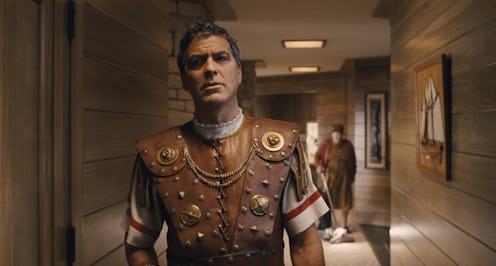Entertainment
George Clooney's New Role Nods To Old Hollywood

"Hail, Caesar! is a prestige picture with one of the biggest stars in the world," announces Josh Brolin's character Eddie Mannix in the latest teaser for the new Coen Brothers film of the same name. Mannix pauses for dramatic effect, and then announces: "Baird Whitlock." Up flashes George Clooney, in classical Roman garb and looking stoic and battle-ready. Though Hail, Caesar! opens with the making of this crown jewel of studio Capitol Pictures, it soon hones in on a group who call themselves "The Future" — and who kidnap Whitlock. It's an outlandish premise, but given all the old Hollywood references in the trailers (including Mannix, who really worked as a fixer for MGM in the 1940s and '50s), it's worth wondering: Is Baird Whitlock a real person?
Unless we're talking about a professor at Midwestern State University in Texas and prolific author of out-of-print texts, then no, Baird Whitlock is not a real person. Clooney's character is a pastiche of a few different vintage Hollywood matinée idols — an out-of-use term for actors with cult, usually female, followings in the early days of Hollywood celebrity. Slate recently did a study of the main Hail, Caesar! trailer, annotating different frames to compare them to classic Hollywood references from The Million Dollar Mermaid to Anchors Aweigh . And though the site didn't find quite as direct a corollary as for Tilda Swinton's or Scarlett Johansson's characters, it's clear that Baird Whitlock didn't just spring out of the Coen brothers' minds.
"It's an old-school look at the loony bin of the movie industry," Brolin explains in the featurette. Even though most characters' names don't align with their historical predecessors (with the exception of Mannix), it's impossible not to weave a web of relations around the MGM spin-off Capitol Pictures based on its real-life characters. Here are a few of the stars on which George Clooney's Baird Whitlock might be based.
Charlton Heston In Ben-Hur
Heston plays the titular lead in Ben-Hur (1959), a film that — as seen in the still above — definitely provided aesthetic inspiration to Hail, Caesar! Heston was perhaps best known for that role, though he also appeared in the original Planet of the Apes (1968) and in Julius Caesar (1970) as Marc Antony. And given Hail, Caesar!'s early Roman Empire tone, Caesar might be yet another forebear.
Marlon Brando In Julius Caesar
From A Streetcar Named Desire to The Godfather, Brando was another one of the elite cadre of highly visible, enormously famous movie stars of the middle of the 20th century. Plus, Brando, too, took a stab at Marc Antony in Julius Caesar .
Kirk Douglas — Or Laurence Olivier — In Spartacus
Hail, Caesar! might also be a stand-in for the 1960 film Spartacus, in which Kirk Douglas starred in the titular role. And, as the star of the movie-within-a-movie, that would make Baird Whitlock an analogue for Douglas, or perhaps his equally celebrated co-star Laurence Olivier. Douglas also played the titular role in Ulysses (1954), a hugely successful film that helped launch the Roman period piece trend of the decade.
Richard Burton In Cleopatra
Instead of asking whether Baird Whitlock has a real-life Hollywood counterpart, it might be worth asking whether Baird Whitlock is actually a collage of every Marc Antony actor ever. Because here's yet another instance of an attractive, famed actor in postwar Hollywood tackling the role — Richard Burton appeared in far too many period pieces to count, but Cleopatra , four-time Oscar winner, is chief among them.
Robert Taylor in Quo Vadis
Off the assembly line of hot actors in massive period pieces comes Robert Taylor in Quo Vadis, a 1951 film about a Roman general who questions the reign of Emperor Nero. (In case you missed that history lesson, he's the crazy one who himself aspired to be an actor.)
Clooney himself is an heir to this lineage of huge male movie stars, perennially good-looking and both critically acclaimed as well as popular. So it's fitting that he plays a character assembled from bits and pieces of actors who rose to fame in an era when this kind of movie celebrity was just taking shape — Baird Whitlock might not be a literal stand-in for any one of these vintage Hollywood heroes, but between the visual parallels and the proliferation of movies like Hail, Caesar!, they likely informed Clooney's performance and the Coens' writing.